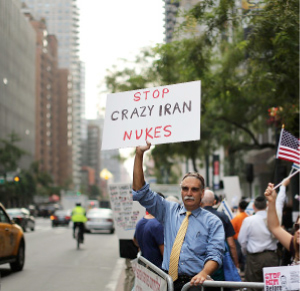Nuclear deal with Iran is possible if bad habits change
The World Today, Volume 68, Number 11
http://www.chathamhouse.org/publications/twt/archive/view/187867
Iran and the South China Sea are top of the 2013 foreign policy agenda with rising tensions forcing them into the world spotlight
On January 21 Barack Obama will be inaugurated for his second term, while in Beijing a new Chinese leadership takes shape over the coming months. But the world is not being made afresh: in both capitals these are old-new leaderships: the Chinese succession process seems designed to minimize shocks and surprises. As for Obama, his strengths and weaknesses are well known.
One thing, however, is certain. Over the next two years Obama will have to make a fateful decision on whether to go to war with Iran over its nuclear programme or push the world to accept a deal that is unlikely to satisfy the Israelis.
What is equally certain is that Washington would like to reduce its Middle East commitments in order to focus on the Asia-Pacific region, where potential conflict presents a threat to the world’s prosperity. In the following pages, two experts look at two major foreign policy issues: the prospects for a deal over Iran and conflict in the South China Sea.
In the past few weeks, there has been a mild increase in optimism about the chances for a successful negotiation on Iran’s nuclear programme. This optimism will be well-founded only if old habits change.
Thanks to the sanctions imposed on Iran, the six states negotiating with Iran – the United States, Russia, China, Britain, France and Germany – have more leverage than ever. The Six are signalling that sanctions relief might be granted in return for far-reaching offers from the Iranians: this has increased the potential value to Iran of negotiating genuinely. Meanwhile, the US is looking for a bilateral track with Iran, and some Iranian spokesmen are receptive.
Also on the plus side, the potential nuclear threat from Iran is still some way off. The International Atomic Energy Age-ncy has confirmed that Iran is converting some of its 20 per cent enriched uranium – the level between reactor-grade and bomb-grade material – into the raw material for fuel plates for its research reactor. In the light of this Israel says its deadline for attack has been postponed. The US had already faced down Israel’s attempt to define the point at which war would be launched. President Obama has set the trigger for war as Iran acquiring a nuclear weapon rather than the Israeli preference of notional weapons capability.
In the final TV debate before his re-election, President Obama said that there was a deal to be done with Iran. The Iranian Foreign Ministry has said it sees no justification for the worries of the Six about Iran’s nuclear activities, but mechanisms were being worked on to remove these concerns.
So is the conundrum becoming easier to resolve politically? In theory, yes. Iran’s mastery of enrichment has sharpened the sense of urgency among the Six after almost a decade of talks. As a result of Israel’s campaign for war, the war option has been exposed as a cost-benefit disaster. All parties have agreed to pursue a settlement based on reciprocity, a phased approach and the terms of the nuclear Non-Proliferation Treaty (NPT), which Iran signed in 1968.
Crucially, politicians on both sides may be coming round to ideas put forward for many years by experts about a phased deal.
Under these Iran would gain:
Iran would concede:
For real progress to be made, however, bad habits, ingrained on both sides, have to be overcome.
First, distrust: this has fixed the negotiators in rigid positions. Tiny offers, when rejected, confirm the perception that the other is not serious. Ayatollah Khamenei, Iran’s supreme leader, should get over his phobia about engaging with the US, as he did in 2001 when both countries worked to overthrow the Taliban in Afghanistan.
Second, overbidding: this is the tendency to propose ideal solutions while letting acceptable ones die from lack of effort.
Ambiguous policies in the West and Israel have damaged their credibility in Iranian eyes. For example, the West says that it has no quarrel with the Iranian people, then, through oil and financial sanctions, hammers the Iranian economy into recession while proclaiming the supposed success of cyber-warfare, sabotage and assassinations.
The failure of the Six to project unity around a single set of detailed negotiating objectives has also not helped. Sensibly, China and Russia have espoused the principle of a phased deal ending with Iran having a normal, though strictly supervised, civil nuclear programme. The West has flirted with such ideas while also seeking suspension of enrichment and, in Israel’s case, the ending of enrichment forever.
That leads to another obstacle, the unwillingness to empower the envoys. Iranian diplomats can be out-flanked by officials and politicians at home who cry betrayal of the revolution; and the cum-bersome mechanisms, electoral considerations and Israel-handling reflexes of the Six limit the flexibility given to their representatives.
Finally, neither side has given due weight to the security concerns of the other.
There is nothing immutable about these habits. After all, in a rational world, each side would alter its approach. While striving for total victory, each has seen its strategic objective recede. The Six have watched Iran advance its nuclear activities steadily since talks began in 2003, potentially endangering the region, the NPT and the West should Iran decide in future to build weapons. And Iran is even further from the respect, security and prosperity it craves.
There is no single key to making a complex, difficult new round of negotiations work for all – but bold and patient leadership in an endeavour that goes beyond the limits fixed so far by both sides would be a step in the right direction.
|
Sunday, December 16, 2012
Subscribe to:
Post Comments (Atom)


No comments:
Post a Comment